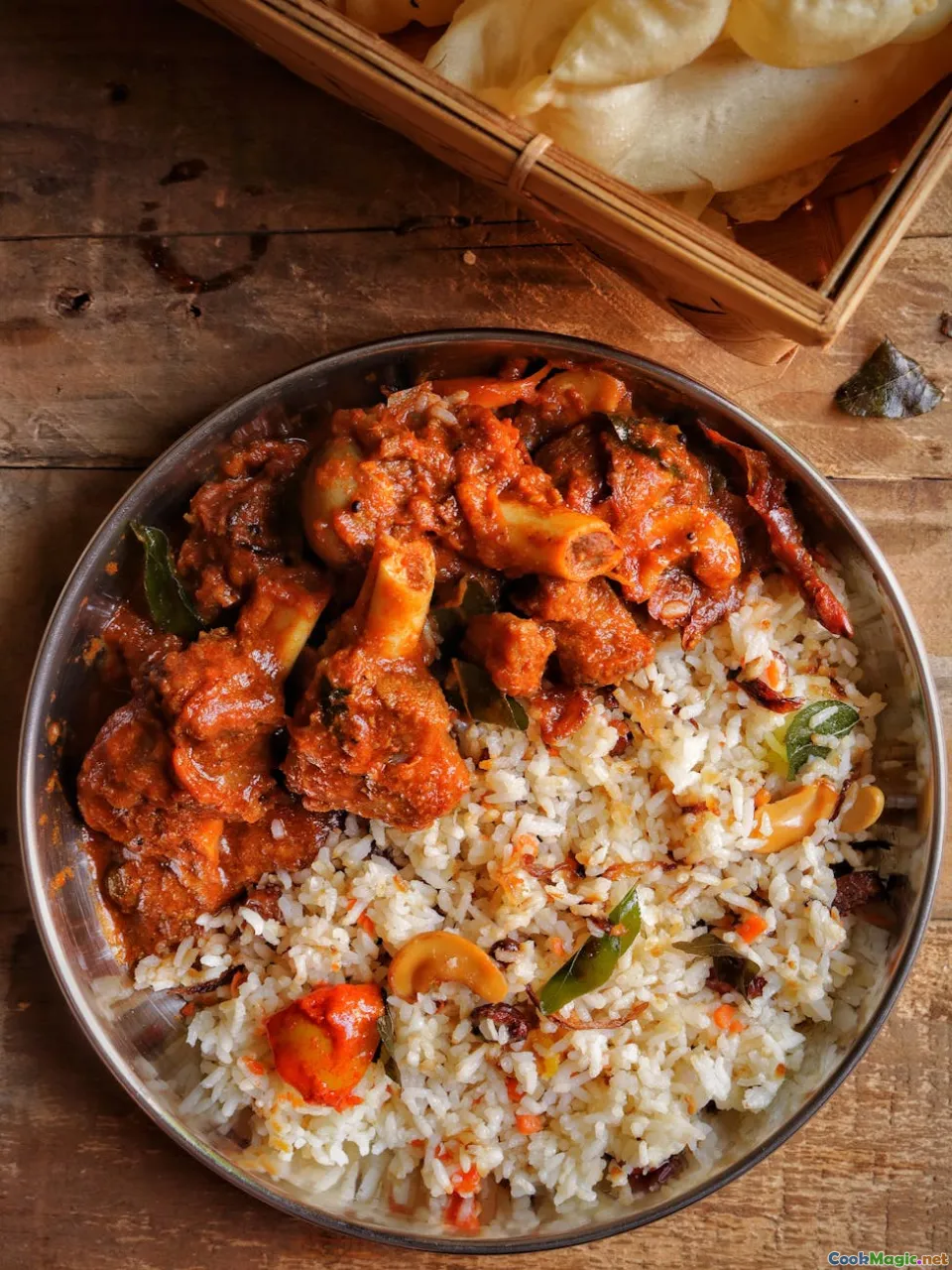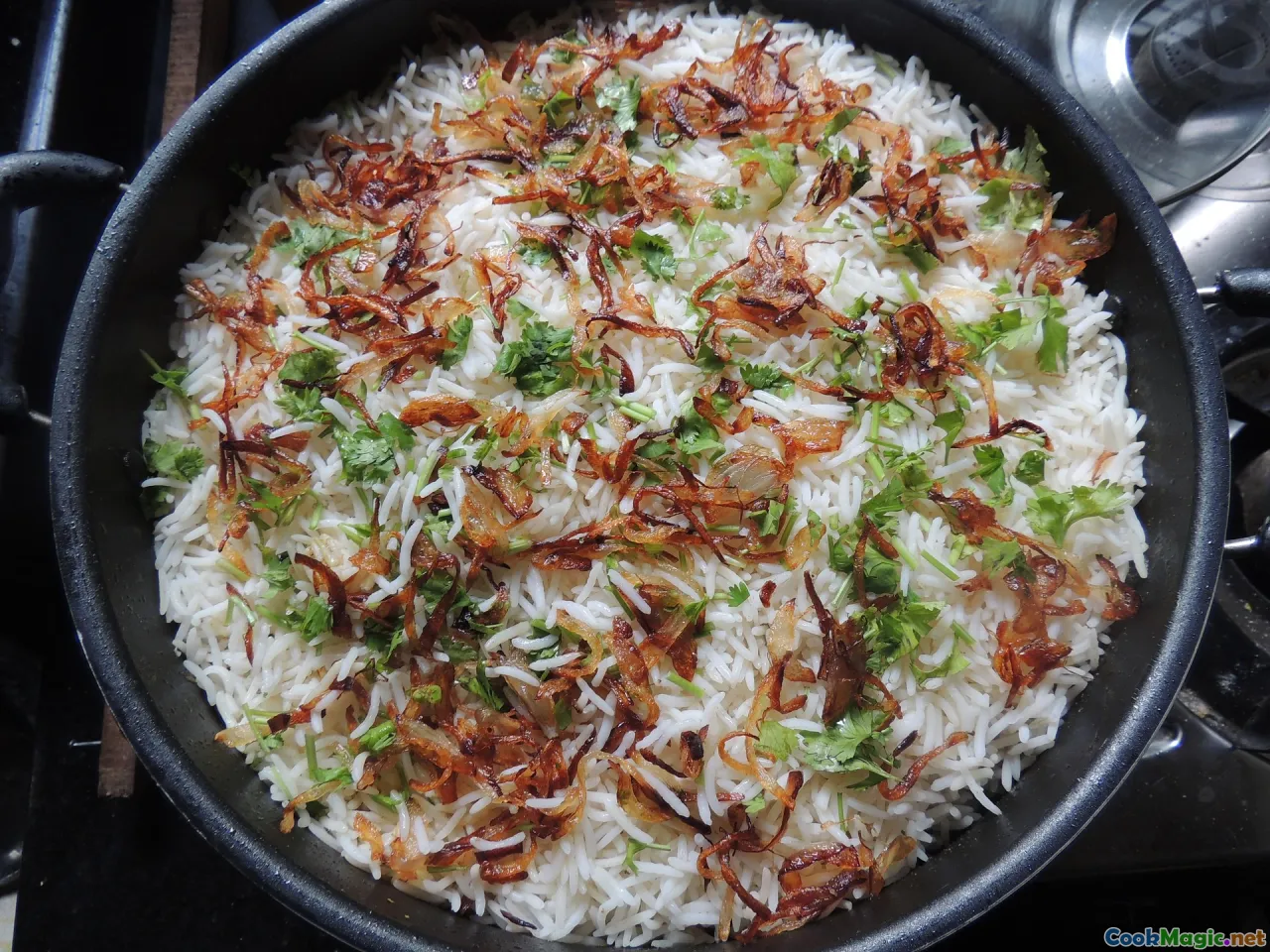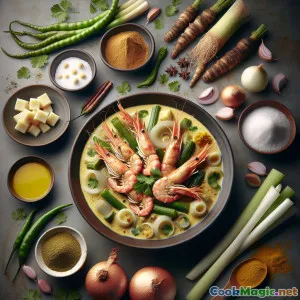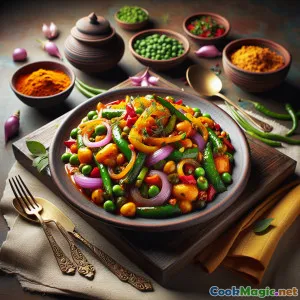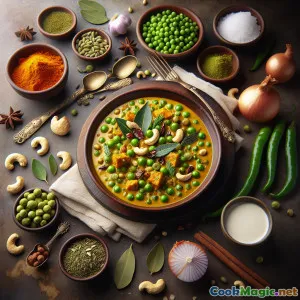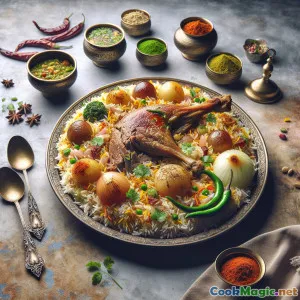
Nawab Bari Kacchi Biryani mit Lammfleisch
(Nawab Bari Kacchi Mutton Biryani)
(0 Bewertungen)0
160
Oktober 11, 2025
Problem melden
Zutaten
-
1200 grams Ziegen- oder Hammelfleisch am Knochen, in 2-Zoll-Stücke geschnitten.
(Shoulder/leg mixed cuts yield best texture)
-
700 grams Basmati- oder Kalijeera-Reis
(Rinse well; kalijeera gives classic Dhaka aroma)
-
4 pieces Kartoffeln, geschält und halbiert
(Waxy potatoes hold shape; Bangla aloo preferred)
-
400 grams Zwiebeln, dünn geschnitten
(For birista (fried onions))
-
250 ml Neutralöl (zum Frittieren von Zwiebeln und Kartoffeln)
(Reuse for flavor; avoid burning)
-
120 grams Ghee
(For layering and richness)
-
60 ml Senföl
(Authentic Bangla note; mellow by heating until smoking then cooling)
-
250 grams Naturjoghurt aus Vollmilch
(Whisk smooth to avoid curdling)
-
3 tbsp Ingwerpaste
(Frisch zubereitet für das beste Aroma)
-
2 tbsp Knoblauchpaste
(Crush fine for even marinade)
-
6 pieces Grüne Chilischoten, längs halbiert
(Auf die Hitzevorlieben einstellen)
-
2 tbsp Zitronensaft
(Balances richness; tenderizes meat gently)
-
2 tsp Kashmiri-Rot-Chilipulver
(Color without too much heat)
-
1 tsp Kurkuma-Pulver
(Adds warmth; go light)
-
2 tsp Korianderpulver
(Citrusy base note)
-
1.5 tsp Kreuzkümmelpulver
(Earthy depth)
-
1.5 tsp Garam Masala Pulver
(Hausgemacht bevorzugt)
-
0.25 tsp Muskatnusspulver
(A pinch for Nawabi nuance)
-
0.5 tsp Macis-Pulver (javitri)
(Classic biryani floral note)
-
1 tsp Grob gemahlener schwarzer Pfeffer
(Frisch zerdrückt)
-
15 grams Salz (zum Marinieren und Schichten)
(Adjust to taste and rice volume)
-
3 pieces Lorbeerblätter
(For rice boiling water)
-
2 pieces Zimtstangen (2 Zoll)
(For rice boiling water)
-
8 pieces Grüne Kardamomkapseln
(Leicht zerdrückt)
-
2 pieces Schwarzer Kardamom
(Smoky depth)
-
10 pieces Nelken
(For rice boiling water)
-
1 piece Sternanis
(Subtle licorice hint)
-
1 tsp Shah jeera (Schwarzer Kümmel)
(Distinct biryani aroma)
-
1 tsp Fenchelsamen
(Optional fragrance in rice)
-
20 grams Salz für Reiswasser
(Seasons rice from within)
-
3 liters Wasser zum Kochen von Reis
(Enough to let grains dance)
-
1.5 tsp Kewra-Wasser
(Use sparingly; potent)
-
1 tsp Rosenwasser
(Optional floral lift)
-
0.5 tsp Safranfäden
(Soak in warm milk for color and aroma)
-
60 ml Warme Milch (für Safran)
(Infuses color evenly)
-
8 pieces Getrocknete Pflaumen (alu bukhara)
(Signature Dhaka sweetness-tang)
-
2 tbsp Rosinen
(Optionale Garnitur)
-
20 grams Frische Minzblätter, gehackt
(For layering)
-
20 grams Frische Korianderblätter, gehackt
(For layering)
-
200 grams Atta (Vollkorn) Teig zum Versiegeln der Ränder
(To seal the pot for dum)
(Shoulder/leg mixed cuts yield best texture)
(Rinse well; kalijeera gives classic Dhaka aroma)
(Waxy potatoes hold shape; Bangla aloo preferred)
(For birista (fried onions))
(Reuse for flavor; avoid burning)
(For layering and richness)
(Authentic Bangla note; mellow by heating until smoking then cooling)
(Whisk smooth to avoid curdling)
(Frisch zubereitet für das beste Aroma)
(Crush fine for even marinade)
(Auf die Hitzevorlieben einstellen)
(Balances richness; tenderizes meat gently)
(Color without too much heat)
(Adds warmth; go light)
(Citrusy base note)
(Earthy depth)
(Hausgemacht bevorzugt)
(A pinch for Nawabi nuance)
(Classic biryani floral note)
(Frisch zerdrückt)
(Adjust to taste and rice volume)
(For rice boiling water)
(For rice boiling water)
(Leicht zerdrückt)
(Smoky depth)
(For rice boiling water)
(Subtle licorice hint)
(Distinct biryani aroma)
(Optional fragrance in rice)
(Seasons rice from within)
(Enough to let grains dance)
(Use sparingly; potent)
(Optional floral lift)
(Soak in warm milk for color and aroma)
(Infuses color evenly)
(Signature Dhaka sweetness-tang)
(Optionale Garnitur)
(For layering)
(For layering)
(To seal the pot for dum)
Nährwerte
- Portionen: 6
- Portionsgröße: 1 Teller (350g)
- Calories: 850 kcal
- Carbohydrates: 0 g
- Protein: 35 g
- Fat: 40 g
- Fiber: 5 g
- Sugar: 7 g
- Sodium: 950 mg
- Cholesterol: 135 mg
- Calcium: 220 mg
- Iron: 5.5 mg
Anweisungen
-
1 - Rinse and soak rice:
Rinse basmati/kalijeera under cold water until it runs clear. Soak the rice in fresh water for 30 minutes, then drain and set aside.
-
2 - Make birista (fried onions):
Heat neutral oil on medium. Fry sliced onions, stirring often, until evenly golden and crisp. Drain on a rack. Reserve the fragrant onion oil for later.
-
3 - Par-fry potatoes:
In the same oil, fry halved potatoes until lightly golden on the edges. Remove and set aside; they will finish cooking on dum.
-
4 - Bloom saffron:
Warm milk gently and add saffron threads. Let steep to release color and aroma. Set aside for layering.
-
5 - Marinate the mutton:
In a large bowl, whisk yogurt with ginger, garlic, mustard oil, lemon juice, chili powder, turmeric, coriander, cumin, garam masala, nutmeg, mace, black pepper, salt, kewra, and rose water (if using). Add mutton, half of the fried onions (crushed), green chilies, prunes, and the fried potatoes. Massage thoroughly until well coated.
-
6 - Long rest:
Cover and marinate in the refrigerator for at least 4 hours (overnight preferred). Bring to room temperature 30 minutes before layering.
-
7 - Parboil rice with whole spices:
Bring 3 liters water to a boil with bay leaves, cinnamon, cardamoms, cloves, star anise, shah jeera, fennel (optional), and salt for rice water. Add soaked rice and cook until 70% done—grains long but still with a core. Drain immediately; discard whole spices.
-
8 - Prepare the handi:
Choose a heavy, wide pot with a tight lid. Smear the base with 1 tbsp ghee and 1 tbsp reserved onion oil to prevent sticking and add aroma.
-
9 - First layer: meat and potatoes:
Spread all the marinated mutton and potatoes evenly on the pot’s base. Drizzle 2 tbsp ghee for richness.
-
10 - Second layer: rice and herbs:
Add half the parboiled rice. Sprinkle a handful of fried onions, half the mint and cilantro, and half the saffron milk. Drizzle 1–2 tbsp ghee.
-
11 - Final layer and seal:
Top with remaining rice, fried onions, herbs, and saffron milk. Drizzle remaining ghee and a spoon of onion oil. Cover with lid and seal the rim with atta dough for a tight dum.
-
12 - Dum cook:
Place the sealed pot on a tawa (griddle) over medium heat for 12 minutes to build steam, then reduce to low for 45–55 minutes. You should smell a mellow, sweet biryani aroma; the dough will harden.
-
13 - Rest and unveil:
Turn off heat and rest 15 minutes. Break the dough seal. Gently fluff by lifting from the sides, keeping rice long and layers intact.
-
14 - Garnish and Serve:
Fold in raisins if using. Serve hot with cucumber raita, lemon wedges, and a crisp salad.
Rinse basmati/kalijeera under cold water until it runs clear. Soak the rice in fresh water for 30 minutes, then drain and set aside.
Heat neutral oil on medium. Fry sliced onions, stirring often, until evenly golden and crisp. Drain on a rack. Reserve the fragrant onion oil for later.
In the same oil, fry halved potatoes until lightly golden on the edges. Remove and set aside; they will finish cooking on dum.
Warm milk gently and add saffron threads. Let steep to release color and aroma. Set aside for layering.
In a large bowl, whisk yogurt with ginger, garlic, mustard oil, lemon juice, chili powder, turmeric, coriander, cumin, garam masala, nutmeg, mace, black pepper, salt, kewra, and rose water (if using). Add mutton, half of the fried onions (crushed), green chilies, prunes, and the fried potatoes. Massage thoroughly until well coated.
Cover and marinate in the refrigerator for at least 4 hours (overnight preferred). Bring to room temperature 30 minutes before layering.
Bring 3 liters water to a boil with bay leaves, cinnamon, cardamoms, cloves, star anise, shah jeera, fennel (optional), and salt for rice water. Add soaked rice and cook until 70% done—grains long but still with a core. Drain immediately; discard whole spices.
Choose a heavy, wide pot with a tight lid. Smear the base with 1 tbsp ghee and 1 tbsp reserved onion oil to prevent sticking and add aroma.
Spread all the marinated mutton and potatoes evenly on the pot’s base. Drizzle 2 tbsp ghee for richness.
Add half the parboiled rice. Sprinkle a handful of fried onions, half the mint and cilantro, and half the saffron milk. Drizzle 1–2 tbsp ghee.
Top with remaining rice, fried onions, herbs, and saffron milk. Drizzle remaining ghee and a spoon of onion oil. Cover with lid and seal the rim with atta dough for a tight dum.
Place the sealed pot on a tawa (griddle) over medium heat for 12 minutes to build steam, then reduce to low for 45–55 minutes. You should smell a mellow, sweet biryani aroma; the dough will harden.
Turn off heat and rest 15 minutes. Break the dough seal. Gently fluff by lifting from the sides, keeping rice long and layers intact.
Fold in raisins if using. Serve hot with cucumber raita, lemon wedges, and a crisp salad.
Mehr über: Nawab Bari Kacchi Biryani mit Lammfleisch
Story and Summary
Nawab Bari Kacchi Biryani is Dhaka’s love letter to celebratory dining, a dish whose aroma alone can fill a street and call a family to the table. “Kacchi” literally means “raw,” a signal that the marinated meat and potatoes go into the pot uncooked, then finish together with partially cooked rice under a sealed lid. This dum technique coaxes tenderness from the mutton while perfuming the grains with kewra, saffron, and whole spices. In this version, inspired by the old Nawab Bari traditions of Dhaka, dried prunes (alu bukhara) add a signature sweet-tart whisper, while golden birista lends both texture and deep caramel notes.
What sets this biryani apart is balance: the musk of black cardamom and mace tamed by yogurt’s creaminess; the richness of ghee brightened by lemon; the hearty comfort of potatoes lifted by mint and cilantro. Every spoonful holds a story of slow cooking and layered care.
A Dash of History and Cultural Significance
Kacchi biryani in Bangladesh grew in the cultural orbit of the Mughal courts, traveling through trade, migration, and marriage into Dhaka’s kitchens. The Nawab families’ cooks adapted the imperial style to local tastes: smaller-grained kalijeera rice for fragrance, potatoes to stretch the feast and please guests, and a lighter hand on chiles balanced with parfum from kewra water. Over time, Nawab Bari Kacchi Biryani became a fixture at weddings, Eid spreads, and milestone gatherings. It is not weeknight food; it is an event, an edible celebration of patience and sharing.
Unique Aspects of This Recipe
- Prunes (alu bukhara) for Dhaka-style sweet-sour nuance.
- Two oils: mustard oil for Bangla bass notes; ghee for luxurious mouthfeel.
- Birista used two ways: crushed into the marinade to deepen flavor, and sprinkled between layers for crunch and caramel complexity.
- Strict “kacchi” method: raw marinated mutton and par-fried potatoes cook together beneath rice, ensuring juices rise to steam the grains.
Tips, Techniques, and Troubleshooting
- Rice doneness: Aim for 70% cooked before layering; a rice grain should break with a firm, chalky core. Overcooking now risks mush later.
- Seal matters: A tight atta seal traps steam, creating the self-basting environment. If you lack dough, wrap the rim with foil, then cover with a heavy lid and a weight.
- Heat control: Start with moderate flame to build steam quickly, then go low for the long simmer. A tawa under the pot diffuses heat to prevent scorching.
- Mustard oil: Heat it to smoking and cool slightly before use to mellow sharpness without losing character.
- Salt layering: Season marinade and also the rice water generously. Under-salted rice flattens the entire dish.
- Birista: Fry slowly and evenly. Over-browned onions turn bitter; pale onions lack depth.
- Resting: The post-dum rest relaxes the rice, redistributes moisture, and stabilizes layers. Skip it and you lose length and fluff.
- Meat choice: Bone-in goat or mutton is ideal; the marrow and collagen enrich the steam. If using lamb, reduce dum time slightly and watch for tenderness.
Serving and Pairings
Serve biryani with cool cucumber raita, a simple kachumber salad, and lemon wedges. A crisp papad or thinly sliced cucumbers offer texture contrast, while a tangy plum or tamarind chutney echoes the prunes’ brightness.
Make-Ahead and Variations
- Make-ahead: Marinate the meat a day in advance. Fry onions a day earlier and store in an airtight container layered with paper towels.
- Rice choice: Kalijeera is traditional in Dhaka for its fragrance and petite grains. High-quality basmati works beautifully and yields a regal length.
- Aromatics: A drop of meetha attar is used in some homes; if using, add only at the very end of layering—too much overwhelms.
- Protein swap: Chicken can be used kacchi-style with shorter dum time (about 35–45 minutes total on low after initial steam build). Reduce marinade acidity slightly.
Personal Notes
I love the theatre of unveiling a dum biryani: the crack of the dough seal, the ascending perfume, the gleam of saffron on long grains. Nawab Bari Kacchi Biryani rewards patience and precision. It teaches restraint—aroma over heat, layering over speed, and the humility to let time do its quiet work. Cook it when you want not just dinner, but a memory.

